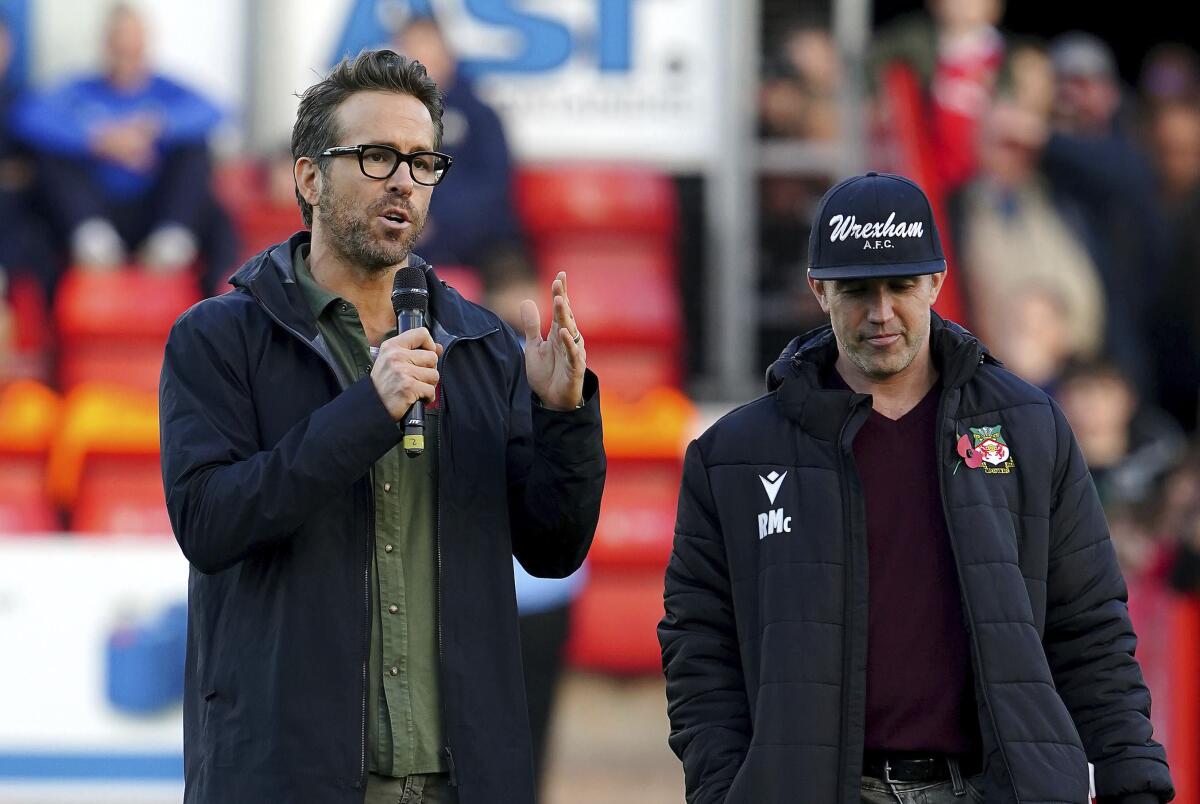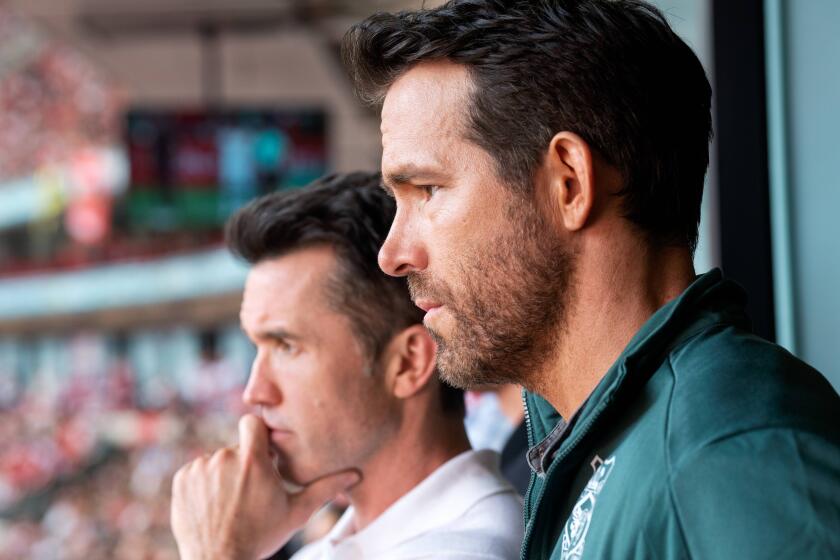Ryan Reynolds got a colonoscopy after losing a bet and it may have saved his life

- Share via
Actor Ryan Reynolds isn’t shy about putting a camera on his face to promote something — his gin company, his cellphone company or one of his movies — but the “Deadpool” star recently decided to let the camera explore inside.
It’s good that he did. When Reynolds lost a bet and had to broadcast his colonoscopy, his doctor found “an extremely subtle polyp” on the right side of Reynolds’ colon and removed it.
In a YouTube video titled “Rob & Ryan Lead From Behind,” Reynolds and fellow actor Rob McElhenney discussed Reynolds’ latest endeavor. (Reynolds and McElhenney co-own the Welsh soccer team Wrexham A.F.C.)
“I would never normally have any medical procedure put on camera and then shared,” Reynolds said, as he checked into a hospital in the video. “It’s not every day that you can raise awareness about something that will most definitely save lives. That’s enough motivation for me to let you in on a camera being shoved up my a—.”
Before going under, Reynolds spoke with NYU Langone Health gastroenterologist Dr. Jonathan LaPook, who explained the process.
“The procedure itself doesn’t take long. We’re talking about 30 minutes, something like that,” LaPook said. “It’s stunningly effective.”
In “Welcome to Wrexham,” Ryan Reynolds and Rob McElhenney try to revive Wrexham’s soccer club — and the struggling Welsh town that depends on it.
According to the Mayo Clinic, a colonoscopy is an exam used to looked for changes in the large intestine (also called the colon) and the rectum. During the procedure a long, flexible tube is inserted into the rectum. The tube has a tiny camera attached to it to allow doctors to view the inside of the colon to look for indications of disease.
The American Cancer Society states that colorectal cancer is the third leading cause of cancer-related death in men and women in the U.S. The organization recommends people at regular risk for the disease begin screenings at age 45.
“This was potentially life-saving for you,” LaPook told the “Free Guy” star. “I’m not kidding. I’m not being overly dramatic. This is exactly why you do this. You had no symptoms.
“So nobody would know that they had this, but [Reynolds] reached the age of screening — 45 — he got a routine screening. .. and that’s why people need to do this. This saves lives, pure and simple.”
Freaked out by Ryan Reynolds’ break from making movies? The actor explained the ‘why’ and ‘for how long’ at an event this week.
But why did Reynolds undergo the procedure?
“You know, at the heart of all sports is competition, and Rob and I, I think, well, we’re pretty competitive guys,” Reynolds said in the video.
“We’re so competitive, in fact, that last year Ryan and I made a bet,” McElhenney added.
“Ryan bet that I could not learn how to speak Welsh,” McElhenney explained in Welsh. “He was so sure, he said he’d publicly broadcast his colonoscopy if I could do it.”
‘It’s Always Sunny in Philadelphia’: A low-budget hit
McElhenney, who is also 45, decided to document his own colon screening after seeing how beneficial Reynolds’ was.
“I figure I can’t go wrong in terms of comparing myself to Ryan,” the “It’s Always Sunny in Philadelphia” star said. “They either find nothing and that means that my colon is cleaner than his, or they find a polyp. And it’s either bigger than his, which is awesome, or it’s smaller than his, which means that I had less of an opportunity to have cancer. Either way, I win.”
Three small polyps were found in McElhenney’s colon and subsequently removed.
McElhenney’s doctor noted that screening and surveillance are the best preventative measures for stopping colon cancer, which he dubbed a “100% preventable disease” with proper screening.
More to Read
The biggest entertainment stories
Get our big stories about Hollywood, film, television, music, arts, culture and more right in your inbox as soon as they publish.
You may occasionally receive promotional content from the Los Angeles Times.












